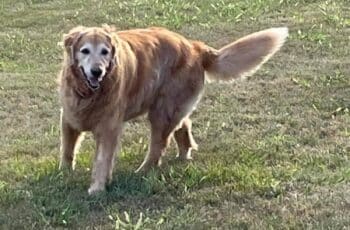
Frank T. McAndrew, a professor of psychology at Knox College, once owned a dog named Murphy.
Murphy’s euthanasia was one of the most painful moments for him and his wife. “I remember making eye contact with Murphy moments before she took her last breath – she flashed me a look that was an endearing blend of confusion and reassurance that everyone was OK because we were both by her side,” he said in his blog.
It’s easy for non-dog owners to think their dog-owning friends’ grief is exaggerated; after all, it’s “just a dog.” However, dog owners are well aware that their companion is never “just a dog.”
Many of his pals have said that they mourn a dog’s death more than a loved one’s. According to a study, losing a canine is almost equivalent to losing a human loved one.
It’s a shame we don’t have mourning rituals or religious ceremonies to show our grief in public.
Grief over the loss of a dog may be more generally understood if people were aware of the profound connection that exists between dog owners and their companion animals.
This would be a huge help to dog owners in coping with the loss and moving on with their lives.
What is it about dogs that evoke such strong emotional responses in people?
Canines are the only animals that have evolved specifically to be human companions and associates. To explain how dogs developed from social creatures to the ones we interact with today, anthropologist Brian Hare wrote the “Domestication Hypothesis.”
It’s likely that giving unconditional and uncritical praise is one of the reasons that dog-human relationships are more satisfying than human ones.
MRI scans show that dogs’ brains respond to praise from their owners as powerfully as food (and for some dogs, praise is an even more effective incentive than food). For example, dogs may learn to recognize people and interpret their emotions through facial expressions.
According to a study, dogs can understand human intentions, want to help their owners, and even avoid those who mistreat them.
Humans respond very much to the dogs’ unconditional love, help, and loyalty. Dogs may provide delight to everybody who sees them. According to surveys, dog owners are happier than cat owners or non-pet owners.
As though you were family
Recent “misnaming” research shows our profound affinity for dogs. Parents frequently refer to their children by their siblings’ names.
Dog names, like human names, are derived from the same “cognitive pool” as human names. But this is rare with cat names that are odd.
According to psychologist Julie Axelrod, the loss of a pet is extremely devastating for dog owners. So, you might lose a source of love, a friend who gives you stability and comfort, or even a childlike mentor.
When a dog dies, it affects an owner’s daily routine more than the death of a close family member or friend. Daily habits and even vacation plans can be determined by pets.
A change in one’s daily routine or way of life is a common source of stress.
Researchers found that many pet owners misidentify vague images and sounds as their pets’ movements, pants, or whimpers. Owners who have a strong emotional attachment to their pets are more likely to experience this reaction.
Dog owners are so used to their pets’ comforting and nonjudgmental presence that they almost always get another one.


